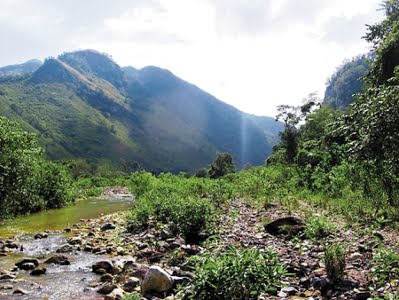By Roberta MaGuire
I live for adventure. I have not had the life experiences of the author of this quote, Helen Keller, nor have I practiced daredevil stunts like bungee jumping or parachuting out of an airplane. Most of my adventures have been on foot, often over long distances, and sometimes in farflung corners of the globe.
Once, on a hike with Kashmiri friends in a remote area of the Himalayas, a village woman grabbed my sleeve and asked me where I
was from. “The United States,” I answered, and when she still looked perplexed, I added “America”. She stared at me. “Just tell me,” she said, “when you get to the mountain pass, do you turn left or right?”
 In Honduras, there is no such confusion. The locals know who gringos are. So, when I set off on a long mountain trek (the only means of travel) with my friend Tessie, we did not expect any surprises. Tessie and her husband operated the clinic and I ran public health, nutrition, and literacy programs in our town in the department of Yoro. (Tessie later became Director of Public Health of Alameda County in California.) We had been dispatched to the town of Esquipulas in the department of Olancho to handle an emergency: All the medical personnel and the lone teacher had absconded, leaving an ominous message on the community center chalkboard: “iAdios para siempre!” (Goodbye forever!} after having been accused of eying local women.
In Honduras, there is no such confusion. The locals know who gringos are. So, when I set off on a long mountain trek (the only means of travel) with my friend Tessie, we did not expect any surprises. Tessie and her husband operated the clinic and I ran public health, nutrition, and literacy programs in our town in the department of Yoro. (Tessie later became Director of Public Health of Alameda County in California.) We had been dispatched to the town of Esquipulas in the department of Olancho to handle an emergency: All the medical personnel and the lone teacher had absconded, leaving an ominous message on the community center chalkboard: “iAdios para siempre!” (Goodbye forever!} after having been accused of eying local women.
Honduras to me seemed like a modernday version of the Wild West. Men sported tengallon hats, cowboy boots, and a gun on each hip. Shootings were common and often involved vendettas or macho pride. No area had a fiercer reputation than Olancho. An American priest and social workers had recently been shot dead there because they were purportedly Communists.
We started out on our journey before dawn and noticed right away that there were only men on the trail. Many kept expressing surprise that we were by ourselves. One stopped us and said, “You’re alone — and unarmed!” “No,” I said. “We’re armed.” “Oh really?” he said. “What are you carrying, a .38?” “No,” I said. “A .22,” did not explain that I meant two hands and two feet.
At the top of one of the peaks, we had stopped for water when I heard my name called from behind a bush. I turned around and was shocked to see Marta, a prostitute from the brothel back in Yoro. The women there were all captives. They had been taken from their povertystricken families and promised decent livelihoods as maids in town. Instead, they had been forced into slavery and would have to pay exorbitant fees to buy their way out. So, Marta had fled. I slipped her some money and wished her well, but I knew the militia would eventually find her and bring her back to that sorry life.
Down in the valley, the river was flooded. We had to ford it with our backpacks held above our heads and the water up to our chests. We climbed the final elevation and caught our first view of the pristine Esquipulas valley, as green and fresh as anywhere we had ever seen. When we finally arrived in town, it was dark, and we ended up sleeping on a table in the community center covered only by an oilcloth.
The next morning, energized by our long walk, we spoke before the entire town. “Your teacher has left but the children need to be educated. Does anyone here know how to read? to write? to do arithmetic?” We set up a schedule with rotating teachers from the volunteer pool. We inventoried the health center and taught volunteers basic first aid and emergency medicine. We could not believe how much could be accomplished in one day!
That night we slept in real (straw) beds and headed home early the next morning, content in our adventures.
